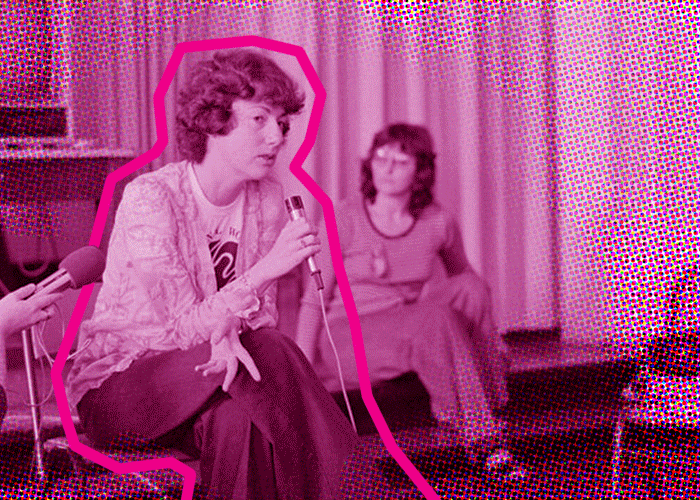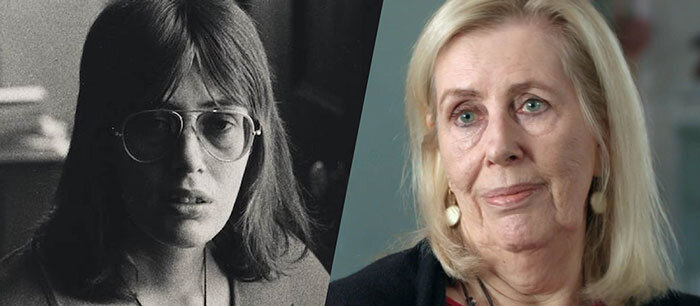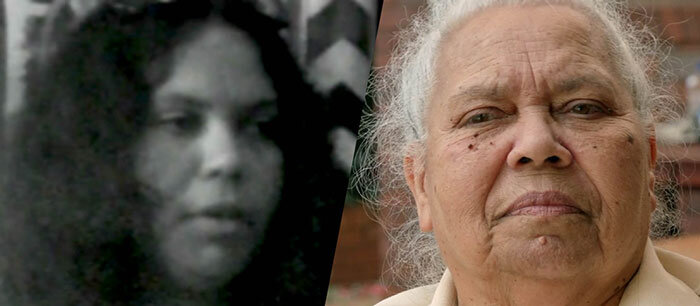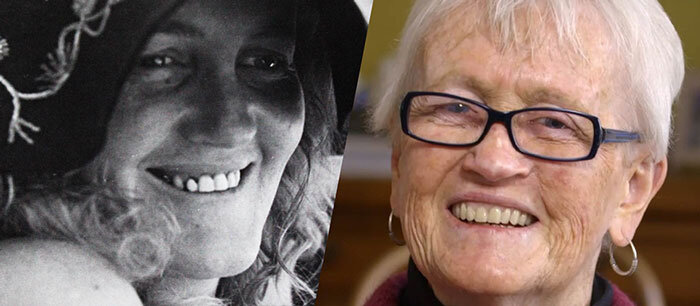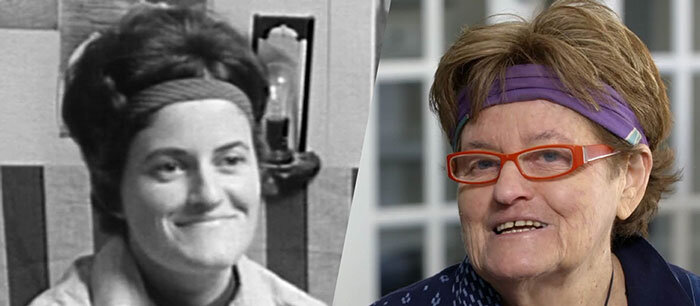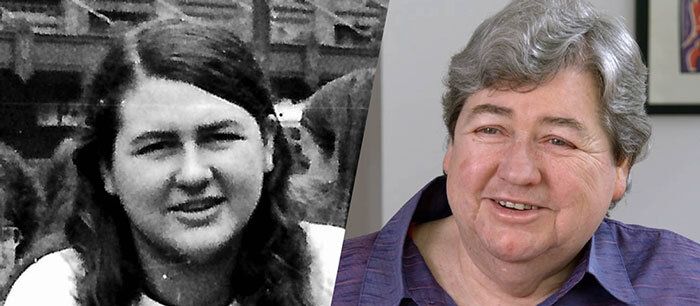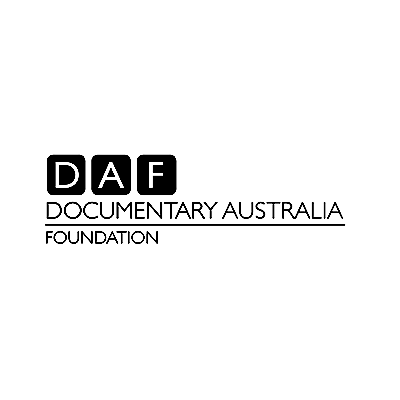
This documentary celebrates the social activism AND THE grass-roots nature of the Women’s Liberation Movement — featuring key activists’ passionate testimonies.
From its first stirrings in Brisbane in 1965 to its controversial incursions into the Whitlam government from 1973 to 1975, the film shows how women began organising around issues such as equal pay, reproductive rights, affordable childcare, and the prevention of family violence and rape. As the story unfolds, these issues go from being dismissed as the outrageous demands of a few “brazen hussies’’ to becoming crucial elements on the platforms of Australia’s major political parties.
From the radical arm of the ‘Women’s Libbers’ to the reform-focused groups such as the Women’s Electoral Lobby, BRAZEN HUSSIES shows the diversity of women involved, and the collective power it took to achieve change. The film explores how ASIO spied on the movement, the pushback by the male-dominated media, and the impact of internal struggles within the movement. Tensions emerge over the inclusion of lesbians and the relevance of the movement to Aboriginal women. These struggles are laid bare to show how the activities of a small group of determined women grew into a huge social movement and ultimately changed the lives and opportunities of ALL women.
Looking at these issues from the perspective of the time, BRAZEN HUSSIES reveals how the changes demanded by these women 50 years ago, have paved the way for where feminism finds itself today. While the landscape, breadth and diversity of feminism is vastly different today – without this movement and the changes it achieved, we wouldn’t be where we are now. Recording and celebrating this important history, offers a valuable opportunity to reassess and discuss where we are at as a society, what gains have been made, what is at risk and where we are headed.

BRAZEN HUSSIES does not present a polished story of struggle and success. Rather, it explores the diversity of approaches, strategies & priorities of the various factions & locations of the women’s movement.
At times the women’s efforts competed. There were divisions. These struggles are laid bare to connect how the activities of a ‘radical fringe’ would ultimately change the lives and opportunities of ALL women forever.
OUR BRAZEN HUSSIES
Merle Thornton
Merle is an Australian feminist activist, author and academic. She is best known for her 1965 action at the Regatta Hotel where she and Rosalie Bogner chained themselves to a bar rail to protest the exclusion of serving women in public bars in Queensland. This action was one of the earliest recorded events which came to define the direct action of the second wave feminist movement worldwide. Thornton went on to found the Equal Opportunities for Women Association which worked to overturn the law that required women employed in the Public Service to resign upon marriage – known as the Marriage Bar- and was successful in 1966. Thornton helped establish Women’s Studies at the University of Queensland where she continued to advocate for social justice and develop feminist and social theory literature.
Martha Ansara
Martha came to Australia in 1969 with some women’s liberation pamphlets she had picked up at a conference in Boston. She shared them around, soon helping to coordinate the first public Women’s Liberation meeting in Sydney. Martha was a leading member of Sydney Women’s Liberation and was involved in groups such as Words for Women, MeJane, Mabel and the Sydney Women’s Film Group, which developed and promoted women’s and feminist filmmaking. Martha was one of the first women in Australia to work as a cinematographer. She is also a filmmaker whose films on social issues have won international prizes. Martha has been a founding member of a number of cultural, women’s and industry organisations. She is a recipient of the Women’s Electoral Lobby’s Edna Ryan Award in 1999.
Margot Nash
Margot Nash discovered Women’s Liberation via a flyer from America for W.I.T.C.H. (Women’s International Terrorist Conspiracy from Hell). She started her career as an actor, in the Australian Performing Group at the Pram Factory in Melbourne. She also performed in anti-war street theatre in the 1970s. With Robin Laurie, Margot formed ASIF – the Anarcho Surrealist Insurrectionary Feminists! in 1973. Their film We Aim To Please about female sexuality, won a Jury Prize at L’Homme Regarde Homme film festival in Paris in 1978. Margot was co filmmaker and editor on the 1982 feature documentary For Love or Money a landmark history of women and work in Australia. For Love or Money received a UN Media Peace prize in 1985. Margot is also a film educator. She was a consultant and a mentor for Indigenous filmmakers at CAAMA and has worked in the Pacific running documentary training workshops for Pacific Island women television producers. Margot is a Freelance Screenwriter, Director and Script Editor. She has made numerous films including, The Silences, a personal essay film about the unspoken traumas in her family.
Pat O’Shane
Aunt Pat is a Yalangi woman from the Kunjandji clan of Queensland. She has been a trailblazer since becoming the first female Aboriginal teacher in Queensland. She then became the first Aboriginal to earn a law degree; the first Aboriginal barrister; and the first woman and Aboriginal person to be the head of a government department in Australia, the New South Wales Ministry of Aboriginal Affairs. In 1976, Pat published an essay in Refractory Girl entitled “Is there any relevance in the Women’s Movement for Aboriginal Women?” which asked white women to consider black women’s perspectives of oppression, which are different to their own. In 2013 Pat was awarded a Deadly Award for lifetime achievement in leadership. She used the win to call for an end to the Northern Territory Intervention. O'Shane was appointed a Member of the Order of Australia in 1984, for public service in Aboriginal welfare. In 1998, she was voted one of Australia's living treasures by the National Trust.
Alva Geikie
Alva chained herself to the Commonwealth Arbitration Court in an equal pay protest with Zelda D’Aprano and Thelma Solomon in 1969. Soon after they founded the Melbourne Women’s Action Committee to fight for women’s rights. Alva was involved in many of their radical feminist actions including the Equal Pay Tram Ride (1970), the anti-Miss Teenage Quests (1970 and 1971) and demonstrations at men-only bars. Alva joined various Women’s Liberation collectives such as the Vashti’s Voice Newspaper and The Women’s Abortion Action Campaign. Alva also worked with Sylvie Shaw on a joint submission for the National Equal Pay case of 1972. In 2005, Alva received an Edna Ryan Award in Sydney, NSW, to honour her contribution as a feminist activist over many years.
ANNE SUMMERS
Anne Summers is a best-selling Australian author and journalist. She was an early member of Adelaide Women’s Liberation, a co-founder of the women studies journal Refractory Girl, and Elsie, the first women’s refuge in Australia. Anne ran the Office for the Status of Women during the Hawke Government (1983-1986). Anne was an advisor to former Prime Minister, Paul Keating during his election campaign in 1993. In 1987, Anne became the editor in chief of Ms. - America’s feminist magazine. She has written several books. Her 1975 book Damned Whores and God’s Police was a landmark piece of Australian writing and has been one of the most influential bestsellers of the past 40 years.
Lilla Watson
Aunt Lilla is a Gangulu woman from Central Queensland. She is an artist, activist, and educator. Aunt Lilla was a member of the Aboriginal Advancement League in Brisbane but left when it became apparent that Aboriginal people could be outvoted by the white majority members. She helped establish the Brisbane Tribal Council where only Aboriginal people could vote. The Tribal Council lay the foundations for Aboriginal run community services that developed in Brisbane in the 1970s such as the medical and legal services, Black housing and childcare. Aunt Lilla developed courses at the University of Queensland which taught Aboriginal Perspectives and Aboriginal Approaches to Knowledge. She was the Inaugural President of the Aboriginal and Islander Child Care Agency, and was a founding member of the Brisbane Indigenous Media Association.
Kerryn Higgs
Kerryn is a writer, activist and songwriter. Her novel, All That False Instruction, was a fictionalised memoir and the first out lesbian novel to be published in Australia in 1975. It was the winner of the inaugural Angus & Robertson publishing prize, but until 2001 was published under the pseudonym Elizabeth Riley, due to the threat of legal action by her mother. Kerryn read The Limits to Growth in 1972 and has been an activist and researcher on issues of environment and social-ecological limits ever since. She used her literary prize money to found a women’s land known as Amazon Acres in 1974. It is still active today. Kerryn’s recent book Collision Course, is about the reckless promotion of economic growth despite its disastrous consequences for life on the planet.
Shirley Castley
Shirley was a member of the Hobart Women's Action Group (HWAG) formed in 1972. That same year they founded the widely-read newsletter Liberaction, which held both a humorous and analytical mirror up to the Australian Women's Movement. The HWAG’s -which included intellectuals such as historian Kay Daniels - also published ‘The Feminist Food Guide’, and a comic strip illustrated by Jenny Coopes, called ‘The Adventures of Super-Fem’. The comic was a satirical critique of the Whitlam government’s engagement with feminism, commenting on the co-option of women into bureaucracies and men's agendas. Shirley delivered a speech at the 1973 Mt Beauty Conference on behalf of HWAG, which called out women’s liberation for discrimination against lesbians. Shirley was on the National Advisory Committee for International Women’s Year 1975 and was part of the Australian delegation to Mexico for the 1975 UN International Women’s Year Conference, where she gave a paper about decriminalising prostitution.
Jeni Thornley
Jeni is a feminist filmmaker and writer. She was active in the anti-Vietnam War movement, performing in experimental protest theatre. She joined the Sydney Women’s Liberation Movement, and the Sydney Women's Film Group (SWFG). As a member of SWFG, Thornley appeared in and worked on the 1973 film, A Film for Discussion. She was later a member of the Sydney Filmmakers Co-operative and the Feminist Film Workers Collective. In 1978, Thornley released her first film, Maidens, which captured “the moment of awakened consciousness that characterised 1970s feminism". Jeni co-directed the 1982 feature documentary For Love or Money, a landmark history of women and work in Australia. For Love or Money, received a UN Media Peace prize in 1985. Jeni managed the Women's Film Fund at the Australian Film Commission until 1986 and has worked as an independent writer, director and producer.
Gillian Leahy
As an anthropology student at the University of Sydney, Gillian Leahy was active in the anti-Vietnam war and Women’s Liberation Movements. Gillian went on to become a filmmaker and academic. She has made over 16 films, mostly documentaries. She is best known for her experimental essay documentary, My Life Without Steve (1986). Her recent film Baxter and Me, is an autobiographical memoir which traces her and her dog Baxter’s life over a year and then reflects on Gill’s past dogs, her involvement in the Women’s Liberation Movement, and her past films. From 1983 until recently, she taught filmmaking at the University of Technology, Sydney.
BarBARA Creed
Barbara discovered Women’s Liberation via her involvement in the Melbourne Gay Liberation Movement in the early 1970s. Creed co-founded the Melbourne Women’s filmmaking group, and in 1975 made a film called Homosexuality: A Film for Discussion as an education and consciousness-raising tool. Barb is an honorary Professor of Cinema Studies at University of Melbourne, where she specialised in the cinema of horror, feminism and psychoanalysis. She is the author of six books on gender, feminist film theory, and the horror genre. Barbara is known for her film and cultural criticism.
Iola Mathews
Iola was one of the ten women who founded the Women's Electoral Lobby in February 1972. She was a journalist at The Age for many years, writing mainly on Education and Women's Issues. In 1983-4 she helped establish the Action Plan for Women in the Victorian Public Service, and in 1984 was appointed Coordinator of
the Action Program for Women Workers at the Australian Council of Trade Unions. As an Industrial officer and advocate, she specialised in women’s employment for which she was awarded an Order of Australia Medal (OAM) She was an advocate in national test cases to improve wages and conditions for women workers, including the parental leave test case and equal pay cases for child care workers and clerical workers. She has published numerous books and articles and in 2006 established Glenfern Writers' Studios in Melbourne.
Eva Cox
Eva is an Austrian-born Australian writer, feminist, sociologist, social commentator and activist. As a baby, her family escaped Nazi-occupied Vienna and became refugees, eventually settling in Australia. She was a long-term member of the Women's Electoral Lobby (WEL). In 1975, Eva established the first commonwealth funded after-school childcare centre. With a group of migrant women and funding from the Women’s Office in Government she produced a report on unemployment called ‘We Cannot Talk Our Rights’ which identified education and childcare barriers to women migrants. She was a part of the feminist journal Refractory Girl in the 1980s, and is a well-known as a social critic. In 1995 she was appointed Officer of the Order of Australia 'for services to women's welfare'. In 1997 the Council of Australian Humanist Societies named her Humanist of the Year.
Elizabeth Reid
Elizabeth Reid was appointed the world’s first advisor on women's affairs to a head of government by Prime Minister Gough Whitlam in 1973. She brought a revolutionary feminist perspective to the job, working to make government more accountable to women. She led the Australian Delegation to the International Women's Year UN World Conference in Mexico City in 1975. In 1977 she was hired by Princess Ashraf Pahlavi of Iran, to establish the Asia and Pacific Centre for Women and Development (APCWD) in Tehran. This came to an abrupt end when the Shah of Iran was overthrown in late 1979. She has had a distinguished career in national and international public service. She founded, established and worked with a number of pioneering and specialised United Nations institutions, government agencies and non-governmental organisations. She was made an Officer of the Order of Australia "for service to international relations, particularly for women’s welfare" and for "HIV/AIDS policy development, in Australia and internationally.”
DaniELA Torsh
Daniela is a feminist author, educator, public servant, journalist and filmmaker, who arrived in Australia in 1948 as a two year old refugee from Czechoslovakia. She was a journalist with The Australian in the early 1970s. During this time she formed the Media Women’s Action Group which successfully opened up membership to the Sydney Journalist’s Club to women journalists, lobbied for childcare and better media representation of and by women. Daniela became prominent in women's education policy and acted as consultant for the Commonwealth Schools Commission. In 1976 she published an education resource called Good Morning Boys and Girls: A Women's Education Catalogue. In the 1980s, Daniela served as the executive producer of the Women's Film Unit of Film Australia.
Biff Ward
Biff has led a life of political activism – Ban the Bomb, Vietnam, Right to Choose, Women’s Liberation, Women Against Rape in War, Close Pine Gap, Close Nurrungar, and support for Indigenous causes. Her working career was as an educator – high school teaching (English and History), the School Without Walls (SWOW) in Canberra, Literacy teacher at the Institute for Aboriginal Development in Alice Springs, and then training in harassment prevention, and mental illness education. Biff’s book Father-Daughter Rape (1984), was one of the first major analyses of child sexual abuse. Her memoir, In My Mother's Hands, is about her family's experience of her mother's mental illness and was long listed for the Stella Prize in 2015.
Sara Dowse
Sara iis an American-born Australian feminist, author, critic, social commentator, and artist. She joined Women’s Liberation as a young mother with 4 children under the age of six. Sara worked in the staff of minister for labour and immigration, Clyde Cameron where she wrote speeches on equal pay, child care, part time employment and extending the adult minimum wage to women. Sara was later appointed head of the new women's affairs section in the Prime Minister's department. The section provided bureaucratic support for Elizabeth Reid, the first women’s advisor to the Prime Minister. After Reid’s resignation in October 1975, the section was upgraded to a branch and Sara became the inaugural head of the first women's unit in the Department of Prime Minister and Cabinet, making her Australia’s first ‘femocrat’ (feminist bureaucrat). Her first novel, West Block, is based on her experiences in government.
Robin Laurie
Robin was part of a community theatre movement in the 1960s and 70s which was interested in taking performance out of buildings and into the streets. As part of Soap Box circus, she performed in anti-Vietnam War street theatre and acrobatics. She was involved in Melbourne’s famous Pram Factory and its subsidiary The Women’s Theatre Group – where, “People (men mostly) said patronisingly what a relief it was that feminists could be funny.” Robin formed ASIF – the Anarcho Surrealist Insurrectionary Feminists! with Margot Nash in 1973. Their film We Aim To Please, about female sexuality and the male gaze, won a Jury Prize at L’Homme Regarde Homme film festival in Paris in 1978. As part of the Women’s Theatre Group she toured factories performing The Women and Work Show in Greek, Italian and English for workers during their lunch breaks. Robin was a founding member of the first Women's Circus in Victoria, as well as Circus Oz. Robin believes comedy is vital for survival.
Suzanne Bellamy
Suzanne is an activist, historian and artist. She was part of the first group of Women’s Liberation in Sydney 1969. She worked on the first Women’s Liberation newspaper MeJane, taught Women’s Studies and Politics at Macquarie University 1974-80, and was National Convenor of the First Women and Labour Conference in 1978. Suzanne worked with Bessie Guthrie on the child welfare campaigns to close the Parramatta Girls’ Home and end the practice of compulsory ‘Virginity Testing’, as well as many other campaigns. She left academia in 1979 to become a full-time artist and writer. Her notable works include the 1996 art performance/ archive installation The Lost Culture of Women’s Liberation 1969-74, the Pre Dynastic Phase, an archaeological, activist women’s history project. She credits the ideas which exploded out of early Women’s Liberation in her student days as continuing “to grow and fuse and morph into life and work, direct action and radical form, ecology and sustainability, creating post-patriarchal consciousness in the midst of difficult changing exciting times". She holds "Comic joy and the creative as sacred energies.”
Kate Jennings
Kate grew up on a farm near Griffith, NSW. At University she became an activist in the anti-Vietnam war and the burgeoning Women’s Liberation Movements. She gained notoriety for a provocative Women’s Liberation speech at a Vietnam moratorium protest in 1970. Kate edited the first major anthology of Australian feminist poetry, Mother I'm Rooted (1975), which was the object of much controversy. She moved to New York City in 1979, where she wrote for numerous magazines and newspapers. Her novel Snake was a New York Times Notable Book of the Year, as was Moral Hazard, which was based on her experiences as a Wall Street speechwriter. She has won the prestigious Christina Stead Prize and the Australian Literature Society Gold Medal.
Rosemary west
At the University of Melbourne, Rosemary West joined a group called Student Action, founded by her boyfriend Bill Thomas to protest against the White Australia Policy. Rosemary was pregnant when Bill was tragically killed in a car accident, on his way to ask her parents’ permission to get married. As a result of this unfortunate situation, Rosemary faced social pressure and isolation because there were few options for ‘unmarried’ women to keep their babies. Armed with her knowledge of student activism, she formed a lobby group to abolish illegitimacy and advocate for the rights of single mothers. Rosemary went on to become a noted journalist, working for The Age for 15 years, and has received the Order of Australia Medal for services to disadvantaged groups in the community and to journalism. Rosemary has continued to serve her community as a Councilor for the City of Kingston, Melbourne since 2003.
Sue jackson
Sue was a Women’s Liberation organiser and activist in Melbourne from the tender age of 18. She was recruited into the Monash University Women’s Liberation Club in 1972 and participated in many Women’s Liberation and Gay Liberation demonstrations, protests and zap actions. Sue was a member of Radicalesbians, which grew out of the Melbourne Gay Women’s Group and had links to both Gay Liberation and Women’s Liberation. Radicalesbians organised Melbourne’s first Women’s Dance and the first lesbian-feminist conference in Sorrento in 1973 attended by 60 women from Melbourne, Sydney and Canberra. Sue worked at women’s health centres and refuges and with Jenny Pausacker, she founded Victoria’s first Women’s Rape Crisis Centre in 1974.

KEY CREATIVE HUSSIES
Catherine Dwyer
Director & Writer
First time Director, Catherine Dwyer, was inspired to make a film about the history of the Women’s Movement in Australia through her experience working as Associate Producer – Post Production, Researcher and Assistant Editor on Mary Dore’s critically acclaimed and award winning documentary She’s Beautiful When She’s Angry (2014) - the story of the US Women’s Liberation Movement.
Catherine was the Impact Producer on Freedom Stories (dir. Steven Thomas 2016), a documentary that explores the achievements and stories of former ‘boat people’ who arrived in Australian waters seeking asylum. Catherine has also directed and edited music videos and shorts.
Andrea Foxworthy
Producer
Andrea Foxworthy is an experienced Producer and Production Manager based in Melbourne. At Sensible Films she coordinated post-production of the CinéfestOZ prize-winning Putaparri and the Rainmakers and worked with Impact Producer Julianne Deeb on the festival and impact campaign for the film. In 2010 Andrea first discovered the chutzpa of the second wave activists of the Australian Women’s Movement, when she produced On Her Shoulders (2011) for UN Women, to commemorate the centenary of International Women’s Day. On Her Shoulders was
nominated for an ATOM Award (Best Short Documentary), won ‘Best Short’ at the 2011 La Mirada Film Festival, screened at Revelation Perth International Film Festival, was broadcast on ABC TV, distributed to Australian High Schools and has had over 100,600 YouTube views.
At Early Works, Andrea Co-produced Indonesia Calling: Joris Ivens in Australia (2009, ABC TV/MIFF Premiere Fund). As a freelance Production Manager, Andrea has helped ensure the smooth delivery of many broadcast documentaries including Indian Wedding Race (2016, SBS), Sperm Donors Anonymous (2015, ABC), Devil Island (2013, ABC/ITV/France Television /NGTI), Acid Ocean (2013, SBS/ARTE/SVT/ZDF/WGBH/ZED), An Unstoppable Force (2008, ABC), Hidden Treasures Series 2 (2008, ABC), PNG: The Rules of the Game (2007, SBS/ITVS) and Dogstar (2007 & 2012, 9 Network/BBC).
PhilipPa Campey
Producer
Philippa is the founder of Melbourne-based production company Film Camp. Over the past 15 years Film Camp has produced many critically acclaimed and commercially successful feature documentaries including Bastardy, murundak: Songs of Freedom, Iraq, My Country. Her debut feature drama Galore premiered at Berlinale 2014, The Face of Ukraine: Casting Oksana Baiul, won the Short Film Jury Prize at Sundance 2015 and her debut short Clara won the Jury Special Mention in Cannes 2005.
Other films have won awards at AFI Fest, FIFO and Seminci Valladolid, and have screened at over 100 festivals in the world including Venice, Berlinale, Telluride, True/False, BFI London and Sheffield Doc/Fest. Philippa has most recently released theatrical documentaries The Leunig Fragments about the acclaimed cartoonist and artist, and No Time for Quiet about Girls Rock! Philippa was awarded SPA's Independent Documentary Producer of the Year (2008); Film Victoria's Greg Tepper Award (2009); and is an inaugural recipient of Film Victoria's Natalie Miller Fellowship Women in Leadership (2016).
Sue Maslin
Executive Producer
Sue Maslin is one of Australia's most successful film, television and digital content producers with a track record of creating award winning feature and documentary films. Her most recent is the smash hit The Dressmaker, starring Kate Winslet and Judy Davis. It grossed more than $20 million at the box office and garnered the highest number of nominations at the 2015 Australian Academy Awards, winning five including the coveted People's Choice Award for Favourite Australian Film.
Feature credits include Road To Nhill, winner of 2003 Best Feature Film at Thessaloniki International Film Festival; Japanese Story, winner of 2003 AFI Award for Best Feature Film and Hunt Angels, winner of the 2006 AFI Award for Best Feature Documentary Film. Sue's outstanding 35-year contribution to the Australian screen industry has been recognised in numerous ways.
In 2012 she received the inaugural Jill Robb Award for Outstanding Leadership, Achievement and Service to the Victorian Screen Industry. Sue was inducted into the Victorian Honour Roll of Women in 2018 as well as appointed as an Officer (AO) of the Order of Australia in 2019 for distinguished service to the Australian film industry as a producer, and through roles with professional bodies.
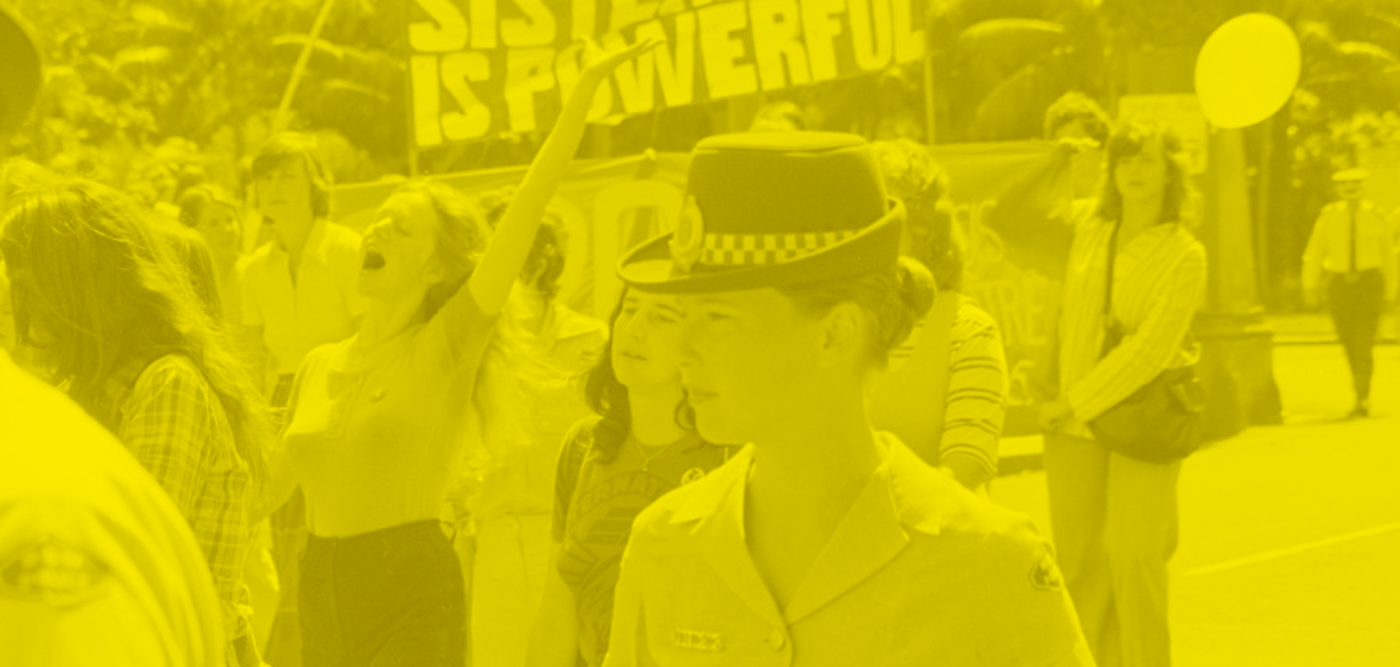
Rosie Jones
Editor
Rosie is an award-winning filmmaker with more than 25 years of experience writing, editing and directing in the documentary field. Among her recent editing credits are the feature docs Namatjira Project and The Triangle Wars (Best Australian Doc, Antenna) and the short docs Suicide and Me, Queen of the Desert, Westall '66: A Suburban UFO Mystery, Obsessed with Walking, Wedding Sari Showdown and My Brother Vinnie. She moved into directing documentaries with Visions of Yankalilla in 1999; her most recent project was the acclaimed doc series The Cult of The Family for ABC-TV.
Annette Blonski
Script Editor
Annette is a very active member of the women’s liberation movement. She is a script editor and writer who has worked in the film industry for over 20 years. She has script edited features, documentaries, short films and television series. Annette’s writing on cinema has been published widely and she has two major publications on women in the industry. She has worked for the Australian Film Commission, Film Victoria, the Australia Council, and was Executive Director of the Australian Film Institute. She also has along history of teaching cinema studies and participating in advisory committees. In 1999, Annette won the WIFT Lottie Lyell Award for Outstanding Contribution to Screen Culture.
Amanda Brown
Composer
Amanda has been composing music for stage and screen since 2000 and before that enjoyed a career as a multi-instrumentalist in several bands. She was a member of cherished Australian independent band The Go-Betweens, with whom she recorded two albums (Tallulah and 16 Lovers Lane) and toured the world.
Amanda’s screen music credits include feature films Babyteeth, Kairos, Son of a Lion and Look Both Ways. Feature documentaries include The Family and Red Obsession (with Burkhard Dallwitz). Amanda was the composer on television series The Secrets She Keeps, On The Ropes (with Endorphin), Grace Beside Me and Wonderland (with Smith and Western) and she is the recipient of several screen awards and multiple nominations. In 2019 Amanda won the Soundtrack Stars Critics Award at the Venice Film Festival for Babyteeth.
Emma Bortignon
Sound Designer
Emma’s enthusiasm for sound design developed while studying film at RMIT in the mid 90’s and she quickly became the go-to sound designer amongst her emerging filmmaker peers. In 1998 Emma completed her BA of Communications (Hon) with High Distinctions in Sound Design and went on to work with a highly respected Post Production Facility in Melbourne where she honed her craft for the next 10 years as Sound Designer/Editor/Mixer. Since launching her freelance career in 2009, Emma won her second Best Sound AFI/AACTA Award and has received many award nominations.
Emma’s innate approach to sound design and belief that sound should not only function to advance the narrative but to expand and enhance the audiences experience, results in innovative and compelling soundtracks. Emma’s 20-year career has taken her all over the world, she has worked on over 50 feature films with some of Australia’s most celebrated Directors and Producers. As a respected senior member of The Australian Film Industry, Emma is often engaged to mentor emerging filmmakers and regularly lectures in Sound Design at Melbourne’s preeminent tertiary film courses. She often sits on industry panels and assists in the adjudication of awards. Emma is also a multi-instrumentalist for the Melbourne band Underground Lovers.
Anna Howard ACS, Erika Addis, Sky Davies
Directors of Photography
Anna Howard is an Australian cinematographer and became an accredited member of the Australian Cinematographers Society (ACS) in 2004. Her work in the Australian film industry began in 198 and her credits include numerous acclaimed roles in feature films, documentaries, television and commercials.
Erika Addis has worked in the film and television industry for over 25 years. Her work as a cinematographer and director of photography includes a broad range of documentaries, feature films and television series’. Her consistent delivery of high standard work has resulted in a raft of award wins including Australian Film Institute (AACTA) awards, awards from the Sydney Film Festival, and ACS Golden Tripod and a Kodak Award from the St Kilda Film Festival.
Sky Davies is an award winning cinematographer working in documentary, drama, commercials, video art and music videos. Sky built a successful career as a camera assistant before stepping into the role of cinematographer. She has worked with, and learnt from, some of the great cinematographers of our time. Her work has been awarded with films creenings in prestigious international festivals and receiving various festival and ACS awards, including 2016’s ACS’s Golden Tripod.
Juliet Miranda Rowe
Animator
Juliet is a cross-disciplinary artist, designer, writer, performer. Over the past decade her illustration, sculpture and installation have featured in exhibitions, including prestigious cultural institutions West Space, Gertrude Contemporary, Bus Projects, Sutton Gallery and NGV International. The premiere of her debut short film Heavy in 2018, signalled a pivot towards a narrative practice. Predominantly working with digital illustration and 2D Animation methods, Rowe balances her time between personal and commercial endeavours.
With a particular interest in projects that centre around untold Feminist, LGBTQIA, POC & First Nations histories she has provided motion graphics on a range of feature-length and serial documentary film projects. Her debut feature credit I Am No Bird premiered at Sydney Film Festival 2019.
Her portfolio includes a diverse range of lens & screen-based media including; creating a multi-storey projection map for White Night 2018, interning on the creation of stop motion VR experience Passenger (produced by Film Camp) as well as animating an extract of 2019 graphic memoir I don’t know how emotions work by Melbourne poet Fury. Her work is recognisable by a commitment to diverse character design and ability to translate complex ideas into accessible narratives.


